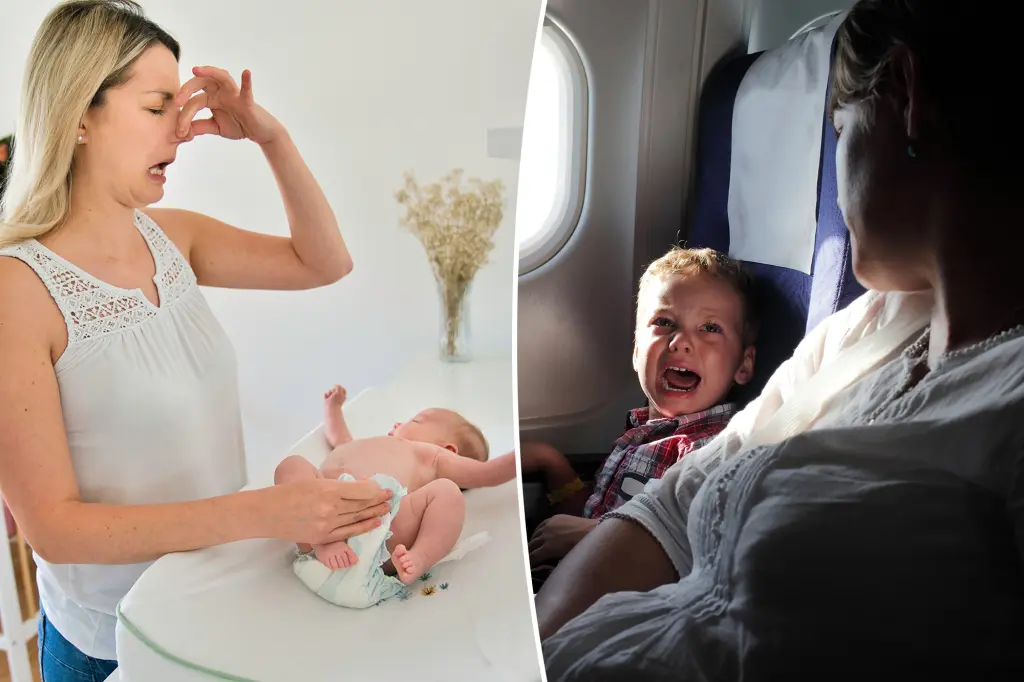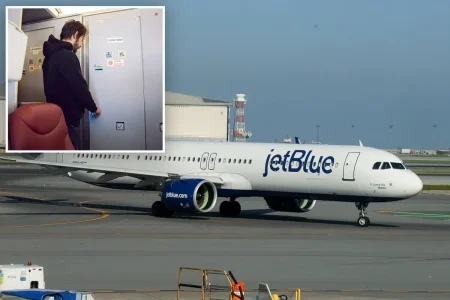When Air Travel Stinks: The Unsavory Tale of In-Flight Diaper Changes
In the confined space of an aircraft cabin, where personal boundaries are already compressed to the minimum, one passenger’s recent experience on an American Airlines flight from Dallas to Philadelphia crossed into truly uncomfortable territory. According to a detailed account posted on Reddit, a couple traveling with their baby made the bewildering decision to change their infant’s soiled diaper directly on the middle seat between them, rather than using the designated lavatory facilities. The resulting odor was so potent it reportedly “woke multiple people up from a firm sleep,” creating an unpleasant atmosphere that lingered throughout the cabin. What made the situation even more disturbing was the allegation that the parents failed to properly clean the seat afterward, essentially leaving a contaminated surface for subsequent passengers. This incident highlights the delicate social contract we all enter when sharing public transportation spaces, where our choices can dramatically impact the comfort and well-being of dozens of strangers around us.
The diaper-changing episode wasn’t the only display of questionable etiquette from these particular travelers. The Reddit poster further described how the couple casually discarded their food wrappers and containers on the cabin floor, ignoring multiple opportunities to properly dispose of their trash when flight attendants made collection rounds. This cumulative disregard for shared space prompted the frustrated witness to issue a somewhat dramatic plea: “Please don’t be that person on board a flight that everyone secretly wants to push out the emergency exit.” While hyperbolic, the sentiment resonated with many readers who have experienced similar violations of unspoken travel norms. The post sparked a robust online discussion about parental responsibilities in public spaces, with the court of public opinion largely ruling against the diaper-changing parents, regardless of the challenges of traveling with infants.
The ensuing debate revealed this was far from an isolated incident, as numerous commenters shared their own encounters with in-flight diaper changes. One disgusted traveler admitted to now routinely carrying disinfectant wipes as a precautionary measure after witnessing similar behavior on previous flights. Another pointed out that such actions typically violate airline policies, suggesting that fellow passengers should either directly confront the offenders or alert cabin crew to the situation. The consensus among most respondents was that while airplane bathrooms are certainly cramped and challenging spaces for changing diapers, they remain the only appropriate location for such activities. As one experienced parent explained, “I flew with infants many times… when I had to change a diaper en route I went to the tiny bathroom, sat on the toilet, put a blanket on my lap, and changed my squirming infant.” This commenter also noted bringing ziplock bags to contain soiled items, demonstrating that with proper planning, parents can manage diaper changes without subjecting the entire cabin to unpleasant sights and smells.
The American Airlines incident echoes a similar situation reported on a Delta flight in August 2024, where parents were likewise criticized for changing a diaper in their seats rather than in the lavatory. In that case, a nearby passenger described the smell as “horrendous” and expressed disbelief at the parents’ decision, stating plainly: “There’s no reason not to do this in the bathroom.” These recurring incidents point to a larger issue about consideration for others in shared spaces. While most travelers understand that flying with babies presents unique challenges, there appears to be a general expectation that certain basic courtesies—like containing biological waste—should remain non-negotiable, regardless of the inconvenience to parents. The tension between parental needs and passenger comfort represents a microcosm of broader social negotiations that occur whenever diverse individuals with different priorities share limited space.
The visceral reactions to these incidents highlight how powerfully our sense of smell can affect our experience of air travel. Unlike visual disturbances that can be ignored by looking away or noise that can be blocked with headphones, odors permeate the entire cabin with no escape possible at 30,000 feet. This sensory invasion feels particularly transgressive in an environment where passengers already endure numerous discomforts: limited legroom, recycled air, and prolonged proximity to strangers. When someone introduces an avoidable biological odor into this already challenging environment, it can feel like an unnecessary imposition on fellow travelers who had no choice in the matter. The Reddit poster’s colorful description of the cabin that “reeked for a while” captures the lingering nature of such incidents, where a single moment of inconsideration can affect dozens of people for hours.
While these stories often generate outrage online, they also serve a constructive purpose by clarifying community expectations around air travel etiquette. The strong consensus against in-seat diaper changes may help inform parents who might otherwise be unsure about proper protocols. Similarly, the practical suggestions offered by experienced parents—using the lavatory despite its limitations, bringing ziplock bags for disposal, and using changing pads to protect surfaces—provide valuable guidance for those traveling with infants. Ultimately, these uncomfortable incidents remind us that air travel represents a delicate social ecosystem where our actions directly impact others’ experiences. Though changing a diaper in a tiny airplane bathroom certainly presents challenges for parents, the alternative—subjecting an entire cabin of captive passengers to unnecessary unpleasantness—clearly violates the unwritten rules of considerate coexistence. As air travel continues to place strangers in ever-closer proximity, our collective commitment to basic courtesies becomes increasingly important for making the experience tolerable for everyone involved.















